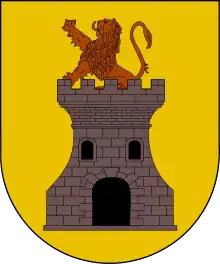Francisco de Salas Reynoso
Francisco de Salas (?-?) was a Spanish military man and politician, who served as Captain, Mayor, Councillor and Lieutenant Governor and Justice major in the Ciudad de Trinidad y Puerto de Buenos Aires.[1]
Captain Francisco de Salas | |
|---|---|
 arms of Salas | |
| Lieutenant Governor of Buenos Aires | |
| In office 1603–1604 | |
| Preceded by | Francés de Beaumont y Navarra |
| Succeeded by | Manuel de Frias |
| Mayor of Buenos Aires | |
| In office 1613–1614 | |
| Preceded by | Víctor Casco de Mendoza |
| Succeeded by | Juan de Vergara |
| Vice-Mayor of Buenos Aires | |
| In office 1608–1609 | |
| Preceded by | Cristóbal Perez de Arostegui |
| Succeeded by | Pedro Hurtado |
| Personal details | |
| Born | Francisco de Salas Videla y Reynoso 16th century Esquivias, Toledo, Spain |
| Died | 17th century Buenos Aires, Argentina |
| Spouse(s) | Leonor Correa de Santana |
| Signature | |
| Military service | |
| Allegiance | |
| Branch/service | Spanish Army |
| Rank | Captain |
Biography
Francisco de Salas Videla Reynoso was born in Esquivias, Toledo (Spain), son of Juan de Salas and Susana de Barahona, belonging to a noble Spanish family. He was married in Buenos Aires to Leonor Correa de Santana, daughter of Pedro Correa and Antonia Moreno, natives of Andalusia.[2] His wife was a niece of Anton Higueras de Santana, who arrived at the Río de la Plata in the expedition of Juan Ortiz de Zárate.[3]
After settling in the Río de la Plata, Francisco de Salas served as a Royal official.[4] His first public office was perhaps as a Regidor of Buenos Aires, a position he held in 1590.[5] That same year, he was designated as Fiel Ejecutor (dedicated to the control of commercial activities).[6]
In 1602 he was appointed Lieutenant Governor and Justice major of the Río de la Plata.[7] And in 1606 was Council of the City.[8] In 1608 he served as mayor of second vote, and was elected Mayor of the first vote of the city of Buenos Aires on January 1, 1613.[9]
Francisco Salas Reynoso held the honorary position of Alférez Real on several occasions, being in charge of carrying the Royal Standard, and the organization of the festival in honor of Saint Martin of Tours.[10]
References
- De prácticas, comportamientos y formas de representación social en Buenos Aires S. XVII-XIX, REUM (2006)
- Genealogía, Issues 11-12, Revista del Instituto Argentino de Ciencias Genealógicas, 1955
- Los Conquistadores del Río de la Plata, Talleres gráficos de S. de Amorrot, 1937, 1943
- Argentina, gesta britanica: Revaloración de dos siglos de convivencia, Editorial L.O.L.A., 1998, 1998
- Hombres del coloniaje, Casa Oucinde, 1932, 1932
- Acuerdos del extinguido Cabildo de Buenos Aires, Buenos Aires (Argentina). Cabildo, 1907
- Lecturas históricas argentinas ...: Documentación histórica del período colonial by Ricardo Levene, J. Lajouane y cia, 1913, 1913
- LA REVISTA DE BUENOS AIRES, Imprenta de Mayo (1865), 1865
- Historia del puerto de Buenos Aires, Eduardo Madero, 1902
- Descripción geográfica y estadística de la provincia de Santa Cruz de la Sierra, Francisco de Viedma, 1836